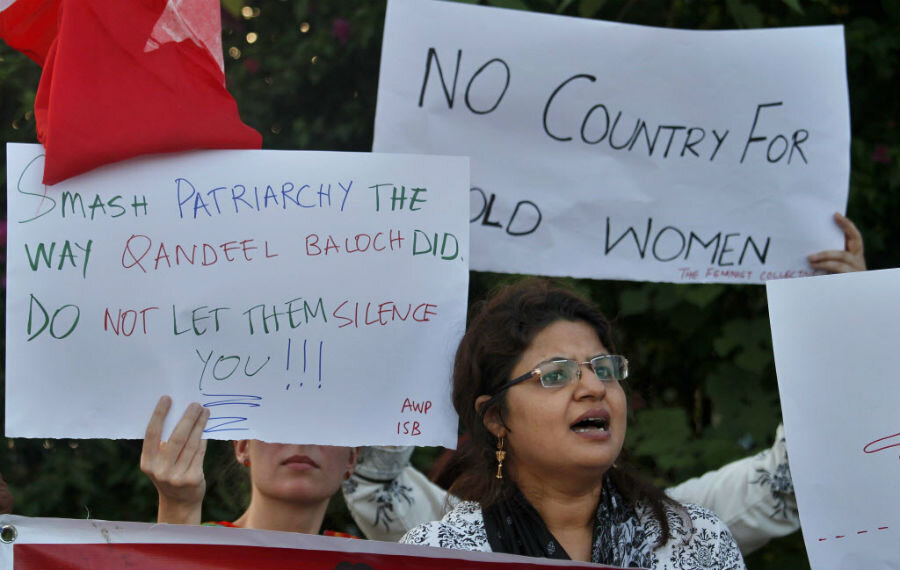Pakistan closes forgiveness loophole for Qandeel Baloch's 'honor killing'
Loading...
The murder of controversial Pakistani fashion model and social media icon Qandeel Baloch by her brother over the weekend has spurred protests, petitions, and online outrage in a country where such so-called “honor killings” claim the lives of roughly 1,000 women per year.
It has also prompted authorities to make an unusual move – taking the role of “complainant” in the case, which effectively bars Ms. Baloch’s family from taking advantage of a loophole in Pakistani law that typically allows a murderer to evade state punishment if the family of the victim forgives him.
The decision means that Baloch’s brother, Waseem Azeem, who admitted to the murder in a press conference this weekend, will likely face charges. But some activists say that this is a stopgap measure and what is needed instead is comprehensive legislation that changes how the government deals with these so-called honor killings – murders that typically involve a family member taking the life of a woman who they perceive to have acted outside of traditional norms of behavior, making legal "forgiveness" common.
“The loopholes in the law must be closed. There cannot be any compromise, waiver or forgiveness,” Tahira Abdullah, a Pakistani human rights activist, told The Guardian. The “blood money” practice of forgiving a perpetrator who pays a fee perpetuates the common attitude that honor killing is acceptable, critics say.
Authorities' decision to become the complainant in the murder, despite the fact that Baloch's father, Mohammad Azeem, has said that he would press for charges, could mark a shift in how Pakistani officials respond to these murders. In the past, honor killings have often been followed by family forgiveness, light sentencing, or incomplete investigations, experts say.
Baloch, whose real name is Fauzia Azeem, rose to fame via her social media accounts and became a voice for women's freedom of expression in the socially conservative nation. Her murder is the latest in a string of high-visibility killings that have pushed the discussion about violence against women into the center of public conversation in Pakistan.
In 2014, Farzana Paveen was stoned to death by members of her family outside a courthouse in metropolitan Lahore, where she arrived to testify for her husband, whom her family had accused of kidnapping her. The public nature of the attack, and the lack of intervention while Ms. Paveen, who was pregnant, was beaten to death, sent shock waves through Pakistan and the international community. Paveen's father, brother, cousin, and former fiancé were all sentenced to death for the attack, an usually harsh penalty in such cases.
That same year, Saba Qaiser survived being shot and thrown in a river by her father and uncle, and later became the subject of an Oscar-winning film by Pakistani filmmaker Sharmeen Obaid-Chinoy, "A Girl In The River." The film and Ms. Qaiser's story prompted Pakistani Prime Minister Nawaz Sharif to promise to tighten the laws around these murders.
“This is totally against Islam and anyone who does this must be punished and punished very severely,” Mr. Sharif told the Guardian after the Pakistani premiere of the film earlier this year. “Changing the law is something that needs to be done at the earliest possibility.”
Pakistani law minister Zahid Hamid reiterated that commitment in an interview with the Wall Street Journal earlier this month. While Punjab, the state where Baloch was murdered, enacted controversial legislation against all forms of violence against women earlier this year, the government has yet to pass an "Anti Honor Killing Bill" long sought by activists.
Speaking with Al-Jazeera in response to Baloch's murder, Ms. Chinoy, the filmmaker, called so-called honor killings “an epidemic,” and said that change needs to come from the government.
"It's upon the lawmakers to punish these people," she said. "We need to start making examples of people. It appears it is very easy to kill a woman in this country – and you can walk off scot-free."





